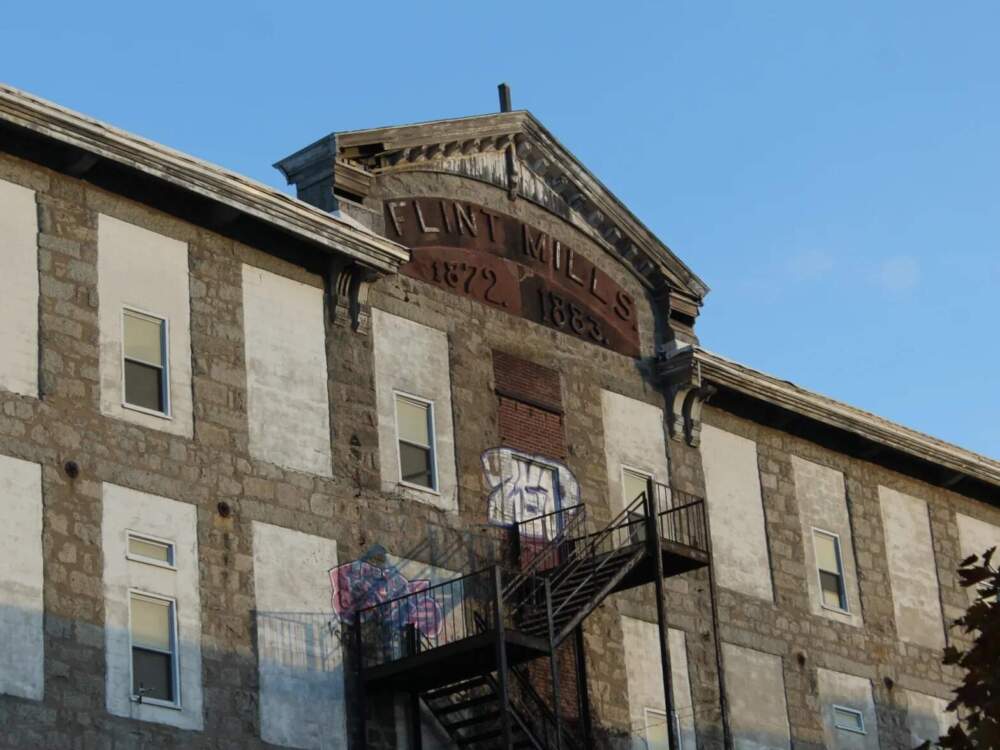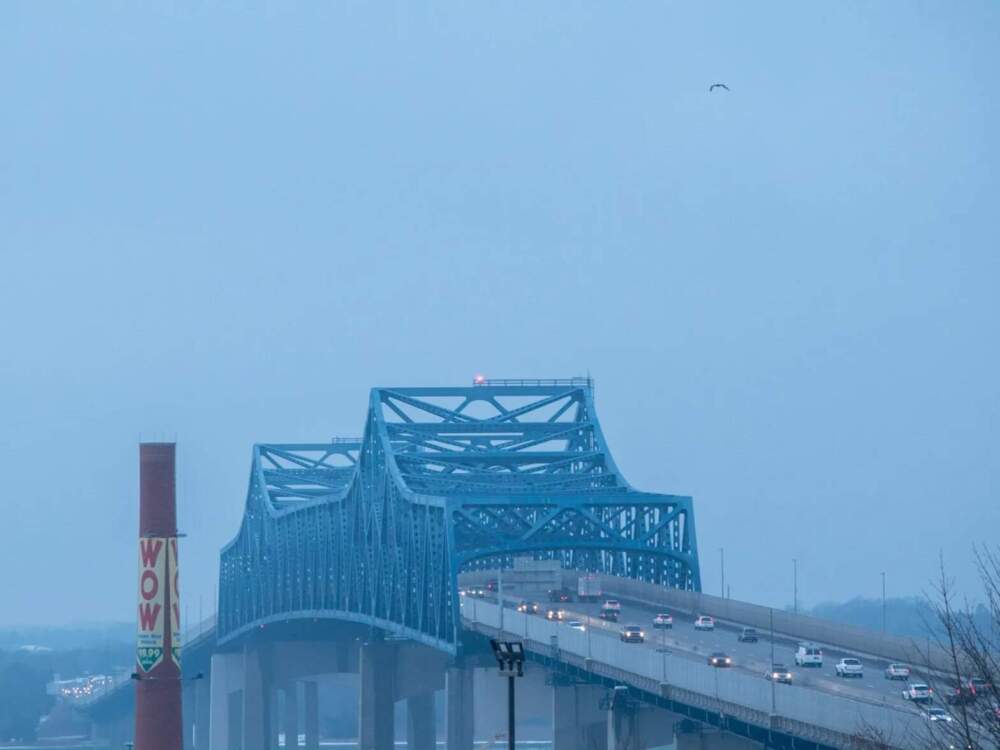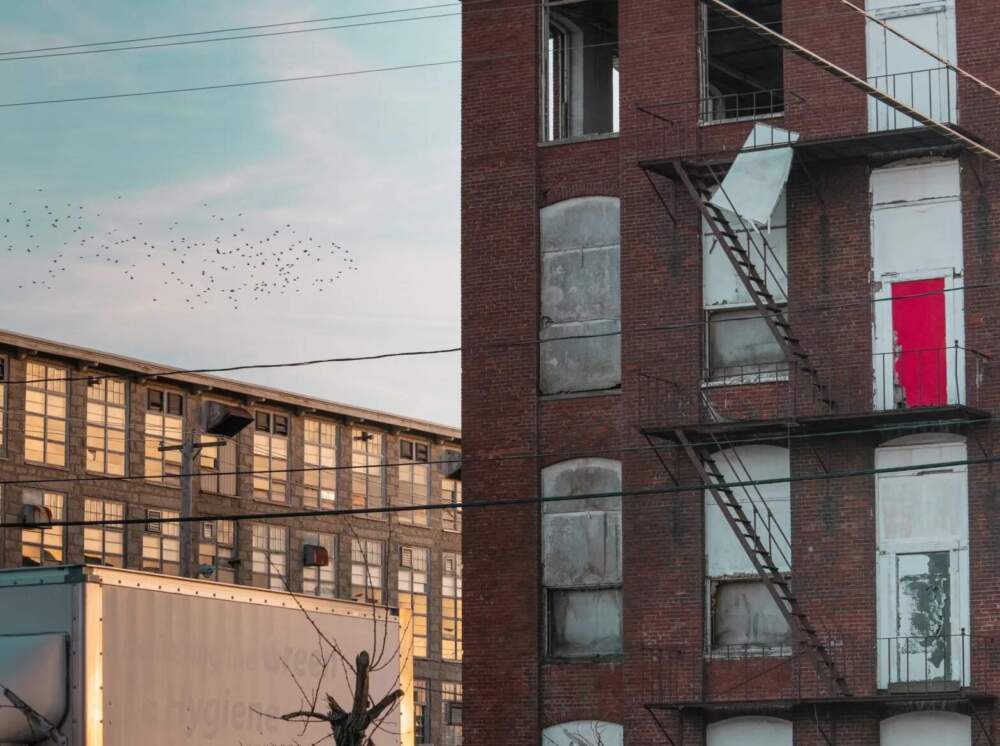Advertisement
Fall River voters are embracing Trump and his harsh stance on immigration

Fernando’s Place is a bar in Fall River, in a part of town called the Flint. It’s a hole in the wall spot next to an auto body shop. Inside, there’s a pool table, a lottery ticket machine, and a TV regulars use to watch Champions League soccer on weekday afternoons.
The view from the front door is of an abandoned factory, the Flint Mill, that gave the neighborhood its name when it used to manufacture textiles and clothing. When asked, the bar’s manager, Lucy Oliveira, couldn’t recall how long ago the factory closed.
“Oh, sweetheart, a long time ago,” she said. “I don’t remember good, but at least six, seven years.”
Oliveira lost most of her lunch crowd when the factory closed, but she still serves Portuguese pork sandwiches like caçoila and bifana to a crowd of regulars. They’re mostly guys from the neighborhood, several of whom work odd construction jobs.
On a recent Thursday night, nearly all of Oliveira’s customers said they support Donald Trump. Each had their own personal reasons, as did Emmanuel Faria Mota, the bartender, who goes by Manny.
“It was that might that he’s got. That look,” Mota said.

Widespread pro-Republican sentiments are relatively new to Fall River. Democrats have dominated politics in this mill city for almost 70 years. The city’s mayor, congressman and state legislators are all Democrats. When it comes to the presidential ticket though, Fall River is losing thousands of Democratic votes every election.
When John Kerry and Barack Obama topped their respective tickets in 2004 and 2008, about three in every four people in Fall River voted Democratic. But those numbers went way down when Hillary Clinton ran against Donald Trump in 2016, and Joe Biden fared even worse in 2020: the current president won just 54% of Fall River.
Much of this shift can be attributed to the fact that Fall River is a post-industrial city with a large white working class — the exact type of place Trump has wrested from the Democrats in other states. Oliveira said Trump’s brand as a successful businessman plays well in Fall River.
Advertisement
“Everybody wants to go for Trump because the economy is so bad,” Oliveira said.
Fall River has swung harder to the right than nearly every other city in Massachusetts. Only Methuen, on the New Hampshire border, had a higher share of Trump voters in 2020.
To understand what’s happening in Fall River, Boston University political scientist Daniela Melo said it’s important to consider the city’s unique demographics.
“You cannot understand Massachusetts, at least our part of Massachusetts, without understanding how the Portuguese think,” said Melo, who is Portuguese herself.
Much of the Democratic Party’s current popularity with Portuguese Americans dates back to 1958 when John F. Kennedy, then a Democratic senator from Massachusetts, co-sponsored a special immigration law. The Azorean Refugee Act created a legal pathway for Portuguese families to immigrate to America after a destructive volcanic eruption on the island of Faial. Thousands of people suddenly had the right to immigrate to Fall River from the Azores, a chain of nine Portuguese islands thousands of miles away.
“We often refer to Fall River as the tenth island,” Melo said, recounting a local joke.
There’s also a similar quip about the Charles M. Braga Jr. Memorial Bridge, whose handsome blue steel trusses span a mile over Mount Hope Bay as they carry Interstate 195 into Fall River. People like to joke that it’s the longest bridge in the world — because it connects Portugal to the United States.

By the numbers, Fall River is the most Portuguese city in the nation. In 2007, the Census Bureau estimated that more than half the city’s roughly 95,000 residents had Portuguese ancestry. But that share is falling slightly today. Immigration from Portugal slowed after the overthrow of the country’s dictator in 1974. America has also imposed stricter immigration laws.
“It has been very long since there was any meaningful influx of fresh immigrants from Portugal,” Melo said.
Melo said Fall River’s Portuguese Americans have since integrated themselves into the white American identity — like the Jews, the Irish and the Italians before them. Many Portuguese families are now in their second, third or fourth generation in the United States.
While there’s no sophisticated polling about how Portuguese Americans vote, Melo said that, anecdotally, she sees that the loyalty Portuguese Americans traditionally had for the Democratic party is fading. She said the same is happening to the community’s sense of solidarity with new immigrants.
“I think it’s primarily about being a part of the fabric and already feeling integrated,” Melo said, “and potentially seeing people who come without documents as breaking the code, breaching the values of the good American immigrant.”
Melo said there’s a profound sense among Portuguese immigrants that they came to America “the right way.” Many Portuguese immigrants stayed with family when they first arrived, and found jobs in Fall River’s textile factories. Others entered the building trades and founded construction companies. And in their minds, Melo said, the Portuguese Americans upheld traditional family values.
“It’s part of the myth of what makes us Portuguese Americans in New England,” Melo said. “We’re the good immigrants. So I think that ends up playing into how people think about these issues during such a polarized time as we have today, in which immigration is really being politicized for electoral purposes in negative ways.”
In Fall River, many Portuguese Americans still vote Democratic, and hardly anyone suspects this small Massachusetts city could possibly tip the election in a consequential way. But Trump’s foothold in urban Fall River offers another example of the Democratic party’s difficulty connecting with white working class voters, even in deep blue Massachusetts.
Dulce Maria Scott, a professor of sociology at Anderson University in Indiana who has family roots in the Fall River area, said Trump’s promise of bringing factories back appeals to many working-class men without college educations.
“That appeal is the same for Portuguese men,” Scott said. “With the deindustrialization of America, a lot of Portuguese people lost their jobs in Fall River and that whole area. It was a very traumatic experience for a lot of Portuguese people.”

Trump’s remarks demonizing immigrants have also stoked resentments in Fall River over the high cost of sheltering immigrants who arrive in Massachusetts without jobs or family members to support them. That sentiment is only made more intense by widespread perceptions that Fall River suffers from a lack of government investment.
Manny Mota, the bartender at Fernando’s Place, said that everyone in his family used to be a Democrat. But he said the Flint neighborhood has gotten worse since they arrived in America, and that he’s gotten sick of politicians promising change.
“Do you see it?” Mota quipped. “Look at our city. Everything’s broken, disgusting.”
“You have to abolish the old,” Mota said. “It has to crash, in order to start new.”
Mota said he’ll vote for Trump this election. In 2020, his perspective didn’t quite represent the majority in Fall River, but in a few days that could change.
This story is a production of the New England News Collaborative. It was originally published by The Public's Radio.